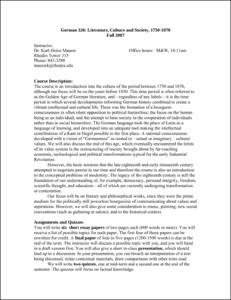Please use this identifier to cite or link to this item:
http://hdl.handle.net/10267/2663| Title: | GERM 320-01, Literature, Culture and Society 1750-1870, 2007 Fall |
| Authors: | Maurer, Karl-Heinz |
| Keywords: | German;Syllabus;Curriculum;Academic departments;Text;Academic departments;Text;Academic departments;Text;2007 Spring |
| Issue Date: | 5-Sep-2008 |
| Publisher: | Memphis, Tenn. : Rhodes College |
| Series/Report no.: | Syllabi CRN 18448 |
| Abstract: | The course is an introduction into the culture of the period between 1750 and 1870, although our focus will be on the years before 1850. This time period is often referred to as the Golden Age of German literature, and – regardless of any labels – it is the time period in which several developments informing German history combined to create a vibrant intellectual and cultural life. There was the formation of a bourgeois consciousness in often silent opposition to political hierarchies; the focus on the human being as an individual, and the attempt to base society in the cooperation of individuals rather than in social hierarchies. The German language took the place of Latin as a language of learning, and developed into an adequate tool making the intellectual contributions of a Kant or Hegel possible in the first place. A national consciousness developed with a vision of “Germanness” as rooted in – actual or imaginary – cultural values. We will also discuss the end of this age, which eventually encountered the limits of its value system in the restructuring of society brought about by far-reaching economic, technological and political transformations typical for the early Industrial Revolution. However, the basic tensions that the late eighteenth and early nineteenth century attempted to negotiate persist in our time and therefore the course is also an introduction to the conceptual problems of modernity. The legacy of the eighteenth century is still the foundation of our understanding of, for example, democracy, personal integrity, freedom, scientific thought, and education – all of which are currently undergoing transformation or contestation. Our focus will be on literary and philosophical works, since they were the prime medium for the politically still powerless bourgeoisie of communicating about values and aspirations. However, we will also give some consideration to music, painting, new social conventions (such as gathering at salons), and to the historical context. |
| Description: | This syllabus was submitted to the Rhodes College Office of Academic Affairs by the course instructor. |
| URI: | http://hdl.handle.net/10267/2663 |
| Appears in Collections: | Course Syllabi |
Files in This Item:
| File | Description | Size | Format | |
|---|---|---|---|---|
| 2007_fall_GERM_320-01_18448.pdf | 122.38 kB | Adobe PDF |  View/Open |
Items in DSpace are protected by copyright, with all rights reserved, unless otherwise indicated.